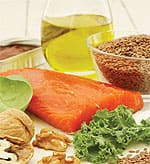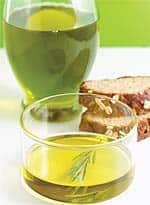Life Extension Magazine®
The Mediterranean diet is one of the healthiest ways to eat on the planet. It’s rich in fiber, fruits-vegetables, and heart-healthy omega-3 fatty acids. You may be surprised to learn, however, that many of its benefits emanate from just one of its components: olive oil.1,2 Emerging scientific evidence suggests that along with other foods found in the Mediterranean diet, specific olive oil compounds—olive oil polyphenols—enhance the diet’s health-promoting effects. For thousands of years, people in Mediterranean countries have eaten a diet rich in fresh fruits and vegetables, whole grains, nuts and legumes, fish, wine, olive oil, and lean meat. The benefits of this approach are well-documented. They range from a reduction in cardiovascular disease risk to lower incidence of neurological disorders, cancer, and even age-related bone loss.3-15 Recent clinical studies indicate that these benefits result from the combined effect of the polyphenols such as hydroxytyrosol found in olive oil, in conjunction with omega-3 from fish, resveratrol from red wine, beta-sitosterols abundant in plant foods, and other constituent compounds of the Mediterranean diet.16 The Power of Olive Oil Polyphenols RevealedExperts have long assumed that the monounsaturated fat content in olive oil is responsible for most of its health benefits. But a growing body of evidence suggests that the collective effects of olive oil polyphenols are just as important.
In 2007, Spanish researchers published a review of multiple clinical trials looking at various aspects of olive oil polyphenolic compounds’ effect on health. The reviewers noted that monounsaturated fat alone could not account for all the observed benefits. “Perhaps a high oleic acid intake is not the sole primary [agent] responsible for the healthy properties of olive oil,” the authors wrote. If this were the case, any rich source of monounsaturated fats, such as non-virgin olive oil, or rapeseed/canola oil, would provide the same benefits as extra virgin olive oil, they argued.17 Another large study indicated that polyphenols are the nutritional “secret weapons” in olive oil. This large, multicenter clinical trial involving 200 subjects from five European countries, examined the effects of daily olive oil consumption on oxidative damage.18 Three different kinds of olive oil were used, each with increasing concentrations of polyphenols.18 Participants were randomly given about 0.84 fluid ounces of one of the olive oils each day for three weeks. Investigators found that all the olive oils increased beneficial high-density lipoprotein (HDL) levels. All three also decreased plasma triglycerides.18 Consumption of medium- and high-phenolic-content olive oil favorably influenced the total cholesterol/HDL ratio and reduced levels of oxidized low-density lipoprotein (LDL).18 “The greatest effects on increasing HDL-cholesterol levels and decreasing lipid oxidative damage were observed after [consumption of] high-phenolic olive oil,” researchers noted.19 This led them to conclude that the polyphenols, rather than monounsaturated fat alone, are responsible for olive oil’s multiple benefits. Olive Oil Works with Omega-3 to Prevent Atherosclerosis
Many of the anti-inflammatory and cardioprotective benefits of the Mediterranean diet come from the omega-3s from fish and other seafood in the Mediterranean diet. However, recent scientific evidence showed that when consumed in combination, omega-3 fatty acids and olive oil polyphenols confer greater benefits than either nutrient alone.20-24 In July 2009, scientists presented data regarding atherosclerosis prevention in a preclinical model of atherosclerotic disease. Norwegian researchers used a blend of marine omega-3 fatty acids and extra virgin olive oil and the progression of atherosclerotic lesions was subsequently assessed.23 Lesion formation was reduced by 54% in the aorta and 61% in the aortic arch of the female animals studied. Among males, significant reductions in lesion sizes were observed solely in the thoracic and abdominal aortas.23 “This effect seemed to be [independent of] lipid metabolism and platelet aggregation,” they concluded. “Hence, dietary supplementation of such an oil mixture may be valuable in the prevention of atherosclerotic vascular diseases.”23 Heart Health Benefits Comparable to AspirinPhysicians routinely recommend that patients at risk for cardiovascular disease take low-dose aspirin because of its anti-clotting and anti-inflammatory action, which reduces the risk of a heart attack or ischemic stroke. Olive oil polyphenols may work just as well.25,26 A recent study demonstrated that olive oil polyphenols decrease the “stickiness” of blood platelets as effectively as aspirin, lowering the risk of clotting.26 The olive oil polyphenol hydroxytyrosol acetate inhibits synthesis of the body’s natural clotting factor, according to the British Journal of Nutrition.26
A clinical trial performed on healthy male volunteers revealed similar findings. Subjects consumed olive leaf extract before submitting blood samples for analysis. Tests revealed a significant dose-dependent reduction in platelet activity with olive extract.25 Dietary olive oil polyphenols have also been shown to significantly lower experimentally-induced inflammation.27 Laboratory rats fed a diet rich in olive polyphenols have shown markedly diminished indicators of inflammation, compared to rats fed olive oil with no polyphenols. Animals with adjuvant arthritis, a model of chronic inflammation, also fared better on a diet rich in polyphenols compared to those on diets without them. Olive oil polyphenols have even been shown to augment the effects of the anti-inflammatory drug indomethacin in pre-clinical models.27 |
||||
Natural Cancer PreventionWhile epidemiologic and observational studies have long indicated the Mediterranean diet is protective against cancer,1,28,29 recent laboratory studies have demonstrated specific mechanisms and pathways by which olive oil constituents inhibit a variety of cancers at multiple stages.30-36 One mechanism involves suppression of fatty acid synthase, an enzyme that helps convert carbohydrates to fat in the human body. Natural compounds have been shown to induce anti-cancer effects by suppressing fatty acid synthase.30
Since olive oil polyphenols have been suggested to possess biological activities that may explain the health-promoting effects of the Mediterranean diet, researchers examined the effects of olive polyphenols on fatty acid synthase production in cancerous breast tissue. Extra virgin olive oil polyphenols, lignans, flavonoids, and secoiridoids were found to drastically suppress fatty acid synthase protein expression in breast cancer cells.30 These findings provided direct evidence of a cancer-protective effect from olive oil polyphenols, offering a previously unrecognized mechanism for olive oil-related cancer preventive effects. British researchers have also reported potent anti-cancer activity by olive polyphenols. Working with an olive oil extract containing the polyphenols hydroxytyrosol, tyrosol, and various secoiridoid derivatives, including oleuropein, investigators examined the effects of the extract on human colon cancer cells growing in culture.37 The extract was found to inhibit cancer cell proliferation. Olive oil polyphenols were shown to disrupt a chemical process that ordinarily results in increased cyclooxygenase-2 (COX-2) expression. COX-2, a target of common anti-inflammatory drugs, is known to be involved in the promotion of a variety of cancers.38,39 “Our data suggest that olive oil polyphenols may exert chemopreventive effects in the large intestine by interacting with signaling pathways responsible for colorectal cancer development,” the researchers concluded.37
Another laboratory study, conducted in Ireland, addressed the ability of colon cancer cells to metastasize, or spread.32 Investigators examined the activity of individual olive oil polyphenols against the invasiveness of human colon cancer cells using a standardized assay. “Phenols from virgin olive oil have the ability to inhibit invasion of colon cancer cells,” researchers concluded. Furthermore, the natural olive compounds inhibited cancer cell invasion “at different levels of the invasion cascade.” Another recent laboratory study concluded that an extract of Greek olives, administered at varying concentrations, was significantly effective at suppressing proliferation of gastric cancer cells.33 At the greatest concentrations, the olive polyphenol extract significantly induced apoptosis, or programmed cell death. All concentrations of the extract reduced inflammation-related protein production by the cancer cells. The researchers concluded, “The extract exhibits gastric cancer preventive efficacy by limiting cell proliferation, inducing cell death and suppressing inflammation in [stomach cancer] cells.” Previous research has also shown that olive polyphenols exhibit antibiotic activity against Helicobacter pylori, the bacterium now known to be responsible for the great majority of cases of ulcer and implicated in the development of gastric cancer. In laboratory experiments, Spanish researchers demonstrated that olive polyphenols exerted strong anti-bacterial activity against eight different strains of the problematic bacteria, including three that are resistant to antibiotics commonly used against them.40 Potential Protection for Aging BonesOlive oil polyphenols may help protect aging bones from becoming fragile. A recent pre-clinical model of post-menopausal bone loss found that olive polyphenols protect against bone loss. Rats fed a steady diet of olive polyphenols avoided the bone loss that those deprived of them experienced. “Polyphenol consumption seems to be an interesting way to prevent bone loss,” concluded researchers.5 In earlier work, the same team of French researchers found that olive oil and its primary polyphenol oleuropein can prevent inflammation-induced loss of bone mineralization (osteopenia)—a prelude to full-blown osteoporosis—in rats that had undergone removal of the ovaries.41
SummaryExtra virgin olive oil is unique among plant-derived oils in that it provides both heart-healthy monounsaturated/polyunsaturated fats and a significant amount of bioactive antioxidant, anti-inflammatory polyphenols. Described as “the most genuine component of the Mediterranean diet,”42 olive oil is now emerging as a critical component of a healthy diet. Research has demonstrated or suggested that olive oil polyphenols play an important role in protecting humans from heart disease, cancer, and age-related bone loss. These effects are due in part to synergistic activity among various natural polyphenols,16 which reduce inflammation and decrease oxidative stress, among other beneficial activities. Research also indicates that the combination of omega-3 fatty acids with olive oil polyphenols offers enhanced benefits, beyond those provided by either nutrient alone.20-23 If you have any questions on the scientific content of this article, please call a Life Extension® Health Advisor at 1-866-864-3027. Editor's NoteScience continues to evolve, and new research is published daily. As such, we have a more recent article on this topic: The Secret Behind the Mediterranean Diet’s Benefits | ||||||
| References | ||||||
| 1. Crit Rev Food Sci Nutr. 2009 Mar;49(3):218-36. 2. Br J Nutr. 2006 Apr;95(4):742-51. 3. Arch Intern Med. 2007 Dec 10;167(22):2461-8. 4. Crit Rev Food Sci Nutr. 2002;42(3):209-21. 5. J Agric Food Chem. 2008 Oct 22;56(20):9417-22. 6. Public Health Nutr. 2007 Jun;10(6):590-8. 7. World J Gastroenterol. 2009 Apr 21;15(15):1809-15. 8. Mol Nutr Food Res. 2009 May;53(5):609-16. 9. Mol Nutr Food Res. 2009 May;53(5):600-8. 10. J Nutr Biochem. 2009 Apr 13. 11. Eur J Clin Nutr. 2004 Jun;58(6):955-65. 12. J Agric Food Chem. 2009 Feb 16. 13. Curr Neurol Neurosci Rep. 2007 Sep;7(5):366-72. 14. Inflammopharmacology. 2009 Apr;17(2):76-84. 15. Eur J Nutr. 2008 May;47 Suppl 2:69-72. 16. Br J Nutr. 2008 Jun;99(6):1199-207. 17. Ann Ist Super Sanita. 2007;43(4):375-81. 18. Ann Intern Med. 2006 Sep 5;145(5):333-41. 19. Pharmacol Res. 2007 Mar;55(3):175-86. 20. Asian Pac J Cancer Prev. 2000;1(1):61-6. 21. Nutr Rev. 2009 May;67 Suppl 1:S126-9. 22. Nutrition. 2009 May;25(5):548-54. 23. J Thrombosis Haemostasis.2009 July;7(2):Abstract PP-MO-795. 24. Nutrition. 2005 Feb;21(2):131-6. 25. Nutr Metab Cardiovasc Dis. 2008 Feb;18(2):127-32. 26. Br J Nutr. 2009 Apr;101(8):1157-64. 27. Inflamm Res. 2001 Feb;50(2):102-6. 28. Nutr Rev. 2006 Feb;64(2 Pt 2):S27-S47. 29. Am J Clin Nutr. 1995 Jun;61(6 Suppl):1321S-3S. 30. Int J Mol Med. 2008 Oct;22(4):433-9. 31. Curr Pharm Biotechnol. 2006 Dec;7(6):495-502. 32. Int J Cancer. 2008 Feb 1;122(3):495-500. 33. Eur J Cancer Prev. 2009 Feb;18(1):33-9. 34. Carcinogenesis. 2006 Sep;27(9):1812-27. 35. Int J Oncol. 2009 Jan;34(1):43-51. 36. Eur J Nutr. 2007 Mar;46(2):70-8. 37. Biochem Biophys Res Commun. 2007 Oct 26;362(3):606-11. 38. Curr Opin Pharmacol. 2009 Aug;9(4):405-10. 39. Surgeon. 2009 Jun;7(3):174-80. 40. J Agric Food Chem. 2007 Feb 7;55(3):680-6. 41. Br J Nutr. 2004 Jul;92(1):119-27. 42. J Nutr Biochem. 2006 Jul;17(7):429-45. 43. J Nutr Biochem. 2009 Jul 17. |





